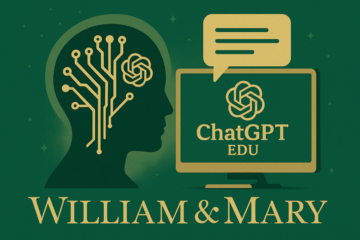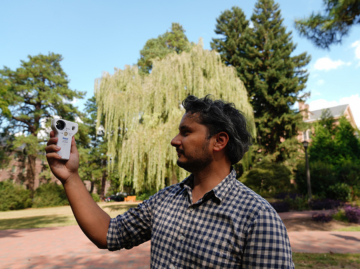William & Mary launches ChatGPT Edu pilot
This fall, William & Mary launched a pilot of ChatGPT Edu, providing select faculty and staff with access to OpenAI’s enterprise-grade artificial intelligence to support learning, research and operations.
The initiative is a collaboration between the School of Computing, Data Sciences & Physics (CDSP), Information Technology, W&M Libraries and the Mason School of Business and is part of a broader push to embed advanced AI into everyday academic life.
The pilot will explore how AI can enhance teaching, research and university operations, while also gathering feedback to guide the responsible and effective use of AI across campus. The results will help shape how W&M leverages AI to advance our world-class academics and research. Additionally, faculty and staff outside of the pilot who are interested in purchasing an Edu license can visit the W&M ChatGPT Edu site for more information.
Unlike consumer versions that are already available, ChatGPT Edu offers beneficial advantages: enterprise-level data protection with single sign-on, enhanced flexibility, and advanced features designed for higher education. Importantly, the Edu platform does not use institutional data to train its models.
“ChatGPT offers a strong blend of features, making it very popular among our students, faculty and staff,” said Chief Information Officer Ed Aractingi, noting that the enterprise license will make advanced AI accessible in a secure, centrally managed platform. Louis Hubert, manager of innovation & AI applications, added that with thoughtful integration into current workflows, AI will help faculty cut down on tedious tasks and give staff more efficient ways to handle administrative work.
Douglas Schmidt, dean of CDSP, sees AI as a catalyst for cross-disciplinary collaboration and a tool to accelerate problem-solving by discovering correlations that may otherwise have gone unnoticed, enabling researchers to innovate faster than ever before.
“By breaking down silos between departments and schools, we are creating opportunities to apply the technological power of AI to diverse domains, sparking new ideas, challenging assumptions, and integrating a wide range of perspectives,” stated Schmidt. The ChatGPT Edu pilot is one of several AI initiatives currently ongoing at William & Mary. W&M also launched a new minor in AI this fall for students to learn how to apply AI in their respective fields, with additional bachelor and graduate-level opportunities under development.
“As the field of AI continues to evolve at a rapid pace, we are committed to adapting our offerings so that our students are prepared to lead and thrive in a world where innovation is constant,” Schmidt added.
By integrating AI tools such as ChatGPT Edu, among other tools including, Google Gemini, NotebookLM, and Microsoft Copilot, the university is positioning itself at the forefront of higher education innovation, empowering students with personalized learning experiences and interactive tutoring, while providing faculty and staff with powerful tools to enhance research, streamline administrative tasks, and reimagine academic approaches.
This initiative reflects W&M’s forward-thinking approach to leveraging AI as a strategic asset that will enhance productivity, foster innovation, and maintain the university’s competitive edge in an increasingly digital academic landscape.
For more information and resources, visit the university’s AI website or contact ai@wm.edu.
Latest W&M News
- Energy Leader Mark Christie to direct William & Mary Law’s new Center for Energy Law & PolicyThe Center for Energy Law & Policy will serve as a hub for convening policymakers, scholars and students to address critical issues shaping the future of energy regulation.
- Learning nature’s languageThe body language of trees holds valuable clues to their overall health.
- The forgotten daughter: Eliza Monroe Hay’s story revealed in her last lettersThe letters inspired a dedicated researcher to uncover the truth about Eliza and to bring her remains back to Virginia for proper recognition.
- Board of Visitors adopts campus blueprint for next 100 yearsThe Board of Visitors unanimously approved the Campus Comprehensive Plan, ensuring stewardship of university physical spaces for future generations.
- Jane Batten HON ’17, L.H.D. ’19 to be 2025 Homecoming Grand MarshalVisionary philanthropist to lead parade as part of Homecoming & Reunion Weekend, Oct. 16-19.
- New dissemination grants promote student research visibility, impactBeginning this year, the Charles Center will offer grants to support students in expanding the visibility of their work, enabling them to share their discoveries with the world.













